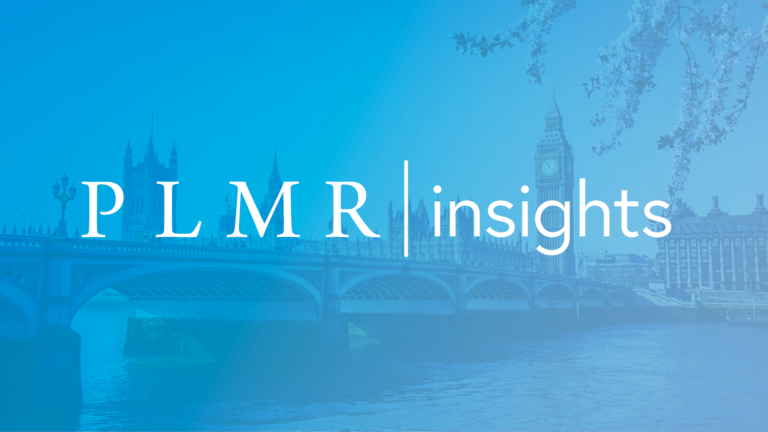- Read the full Queen’s Speech 2022 here.
- Read the Queen’s Speech 2022 background briefing notes here.
Today’s State Opening of Parliament marked only the third time that the Queen has not delivered the speech in her 70-year rule, with Prince Charles doing so in her place. The debate on the contents of the speech began in the House of Commons today at 2:30pm, below PLMR analyses the politics behind the Government’s upcoming legislative programme and the 38 Bills to be taken through the 2022-23 Parliamentary session.
The Queen’s Speech saw the Prime Minister make a significant effort to try and get back on the front foot and refocus on his domestic agenda in the wake of an abundance of issues for his Government, including both unprecedented external crises and self-inflicted own goals. The Government saw today as a chance to move on from last week’s disappointing local election results for the Conservative Party and launch policies designed to appeal to the coalition of voters that gave Boris Johnson an 80-seat majority back in 2019 – with a focus on delivering levelling up and Brexit featuring throughout. Number 10 is aware the clock is ticking and with the halfway point of this Parliament passed, the Government has to deliver improvements that people can see and feel in their daily lives before the next general election. Whether this Queen’s Speech does enough to achieve this remains to be seen, critics will say that they have heard this sizzle before and now is the time to taste the beef.
Elements of the so-called “red meat” agenda for backbenchers on the right of the Conservative Party also form much of the Government’s focus including the measures to showcase the benefits of Brexit, the Public Order Bill to crack down on protesters, various bills to protect freedom of speech including the Bill of Rights to replace the Human Rights Act, and the Higher Education (Freedom of Speech) Bill carried over from the previous parliamentary session. This matters because the Prime Minister, still subject to police, senior civil service and Parliamentary investigations over Partygate, remains in a vulnerable position with his backbenchers. The spectre of a leadership challenge is not entirely off the table so showing influential backbenchers that he understands their priorities and is responding to their concerns is also politically salient for the Prime Minister.
The Government takes aim at the hearts and minds of the red-wall voters, promising a Transport Bill with new rail links and an Education Bill. The central “delivery” aspect of this agenda is the Levelling Up and Regeneration Bill which will enshrine the Government’s levelling up missions in law and give local authorities new powers to force landlords to rent out vacant commercial properties in town centres and high streets. This will also cover the pledge to ‘reform the planning system’ and ‘to give residents more involvement in local development.’
This has been seen as a key priority for the Conservatives but presents a dilemma for the Government with a need to solve the housing crisis on one hand but with planning remaining a major voter concern in Conservative and Liberal Democrat battlegrounds, given the issue is widely credited as a key reason for the Conservative’s loss to the Lib Dems in the Chesham and Amersham by-election in June 2021.
The Queen’s Speech is as much about what was not included as what has been, in terms of Government priorities and direction of travel more than halfway into this Parliament. Number 10 are in election-mode and several bills that were deemed traditionally ‘un-Conservative’ were dropped from the Speech, led by the Prime Minister’s Deputy Chief of Staff David Canzini, who was hired in February following the Partygate allegations and criticism by Conservative MPs. Canzini is understood to have closely scrutinised all the bills planned, removing bills unlikely to be popular or to resonate with voters ahead of the next general election expected next year or in 2024. This includes the multibuy promotions restrictions targeting two for one junk food, an Employment Bill including a right to flexible working, and the Animals Abroad Bill which proposed to ban fur, foie gras and hunting trophy imports, though some of these measures could be slipped into other bills later in the Parliamentary session.
Many will be disappointed, though not shocked that no Bills directly address the cost-of living-crisis right now and, if the speech left any question, the PMs official spokesperson has since stated there are “no plans for an emergency budget” to address the cost of living, aligning with known opposition from the Treasury. According to this speech, wider economic reform is the answer, with pledges to replace legislation previously governed by the EU (Brexit Freedoms Bill), tackle the UK’s delivery of financial services (Financial Services and Markets Bill) and increase opportunities for SMEs to secure Government spending (Procurement Bill).
A looming economic crisis was foreshadowed, and Johnson’s speech warned that the Government is unable to “shield” the public from the impact of the rising cost of living and disruptions caused by Russia. Further spending to address the energy crisis is tempered, with the PM pre-empting the speech, by stating that “for every pound of taxpayer’s money we spend on reducing bills now, it is a pound we are not investing in bringing down bills and prices over the longer term.” While the Prime Minister seemed to leave the door open to more action to address the cost of living in the coming days, it remains to be seen what this will look, particularly as Treasury sources appeared blindsided by this.
In response, both the Liberal Democrats and the Labour party centred their criticism of the speech around a lack of action by the Government on the cost-of-living crisis.
The Labour Party, alongside major trade unions also led criticism that the speech did little to support worker’s rights after an Employment Bill was not included in the Government’s plans. Liberal Democrat leader Sir Ed Davey said the Queen’s Speech ‘does nothing to help the millions of families and pensioners facing soaring bills and eye watering inflation’.
PLMR have provided an analysis of each of the 38 Bills announced today, and how they fit into the Government’s current priorities, available here.




